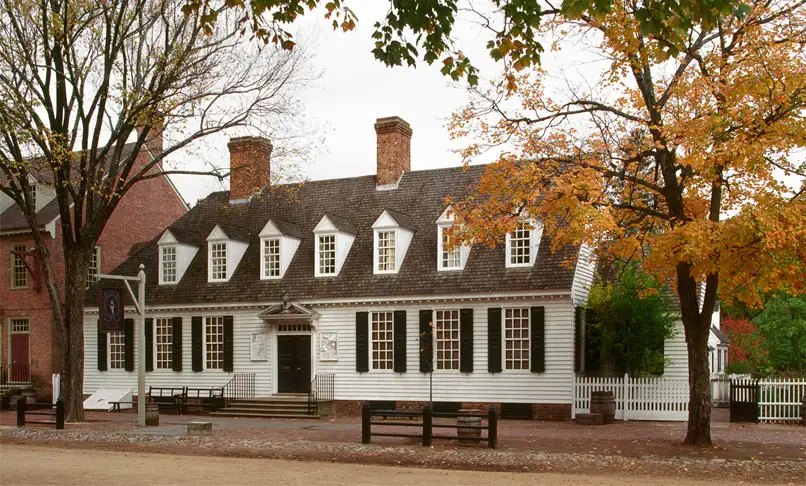History of Phi Beta Kappa
Phi Beta Kappa is the nation’s oldest and most prestigious national academic honor society.
What began as a secret debating society for privileged white men became something very different over the course of the next two centuries. Phi Beta Kappa grew along with American higher education into an organization grounded in liberal—as in the Latin word for “free”—arts and sciences learning and freedom of inquiry. Today, Phi Beta Kappa is known for recognizing academic excellence on more than 290 select campuses across the nation. Its more than 500,000 members come from diverse backgrounds and experiences, and include 17 U.S. Presidents, 42 Supreme Court Justices, and more than 150 Nobel Laureates. On campuses and in communities, the work of the society now attests to the lifelong value of an education that fosters scientific inquiry, liberty of conscience, critical thinking, and creative endeavor for all.

Williamsburg, Virginia
Raleigh Tavern, pictured above, is the founding site of Phi Beta Kappa on December 5, 1776.
History of the Gamma Chapter at the University of Maryland
We only inaugurated the Gamma of Maryland chapter of Phi Beta Kappa in December 1964, after two prior rejections.
The University of Maryland, College Park’s affiliation with Phi Beta Kappa is much more recent than the long history of the society might suggest. We only inaugurated the Gamma of Maryland chapter of Phi Beta Kappa in December 1964, after two prior rejections. An early refusal of the school’s application received the reply from Phi Beta Kappa that we needed a library to be seriously considered! Imagine not having a library on campus! The situation changed dramatically, though, when President Wilson Elkins, himself a member of Phi Beta Kappa, arrived in the late 1950s. Elkins emphasized rigorous academic standards and invented an academic probation plan that threatened over a thousand students—about 18% of undergraduates—with expulsion. As a result of both its higher academic standards and its first library, UMD was finally successful in securing a Phi Beta Kappa chapter on its third application. We thus followed in the footsteps of Alpha of Maryland at Johns Hopkins University, which was established in 1895, and Beta of Maryland established at the then all-women Goucher College in 1905.
Chartering Members
Our chapter is committed to championing education in the liberal arts and sciences, to recognizing academic excellence, and to fostering freedom of thought and expression. We are proud of all our members and extend our deepest gratitude to our founding chapter members:
- Gordon Atkinson (Professor of Chemistry)
- Dudley Dillard (Professor of Economics)
- Emil F. Heerman (Professor of Psychology)
- Michael J. Pelczar (Professor of Microbiology)
- Leonora Rosenfield (Professor of Foreign Languages)
- Homer W. Schamp, Jr. (Professor of Molecular Physics)
- John Sampson Toll (Professor of Physics) *
- Charles E. White (Professor of Chemistry)
Particular thanks go to Professor Toll who was chair of the committee that submitted our third, successful application to Phi Beta Kappa, making us Gamma of Maryland.